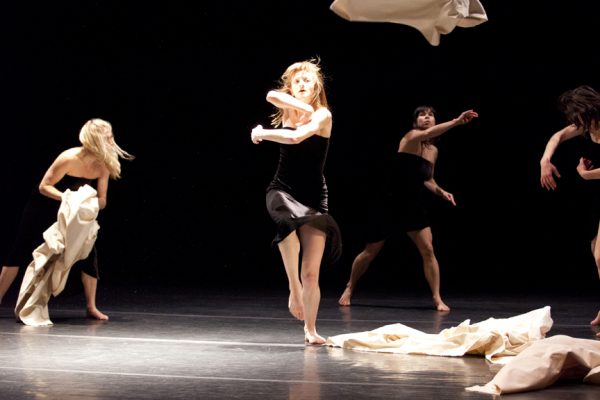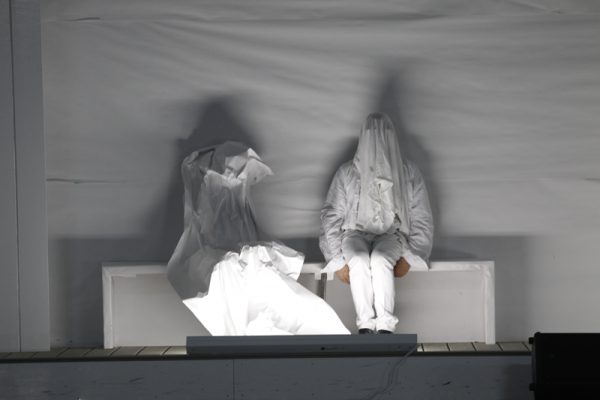David McIntosh knits in the lobby bar of the Holiday Inn in downtown Vancouver. He is making a burgundy sweater vest, and welcoming audience members to M/Hotel, his latest dance-theatre work. McIntosh has been strategic in locating this work inside the first chain to standardize motel and hotel rooms across America. But to say that M/Hotel is “site-specific” fails to capture the unusual nature of this piece. Because site-specific work is an accepted creative form in public spaces, public buildings, parks, etc., viewers may associate a sense of familiarity and safety with the genre. In New York City, site-specific theatre has re-emerged as a hugely successful phenomenon, showing up in all kinds of venues, including hotels. Last summer the Gershwin Hotel became the set for HotelMotel, transformed by The Amoralists into a seedy run-down room inhabited by drug dealers and playing to a maximum audience of twenty. Sleep No More by the UK theatre company Punchdrunk, was held over again and again in 2011, turning audience members loose to roam through several floors of The McKittrick Hotel, hoping to bump into a performer and glean the narrative thread to Macbeth.
McIntosh, on the other hand, is interested in more than a unique set. He knows that entering an ordinary hotel room with a small group of strangers could push one into an unknown, potentially uncomfortable zone. As much as the Holiday Inn strives to deliver a predictable, sanitized experience for travellers, McIntosh strives to create unpredictable, dramatic situations that elicit a response from theatre-goers by dispensing with familiar signs and symbols and relying on the messier details of life. Stays in hotel rooms are a common feature of contemporary life, but within this performance context, even the simple task of entering the room produces a feeling of anticipation and suspense. So, let me tell you what happens inside that hotel room.
The work is performed on the hour from 6pm to 10pm each evening. There are six of us waiting for the 8pm hotel room: an attractive yoga instructor; a sensitive, athletic-looking man; a bushy-bearded older man; a young couple from Surrey; and me, an anonymous writer. We have formed a small group around McIntosh who warmly greets each of us as though he’s entertaining in his own living room. A few yards away I hear the bartender proclaiming the merits of the show, bragging to the guests on bar stools: “There’s like twelve different plays,” he says, and I’ve seen all twelve. I liked the one about the girl found dead in a pool — and there’s actually a pool in this hotel, so I really wondered about that.” The girl from Surrey mentions that her therapist recommended she see the show, to which McIntosh dryly replies that she may need more counselling afterwards.
Dancer Alison Denham slips into the circle, and requests keys from one of us, ‘collateral’ for the room key. Then she says something like: “Your room is ready. Room 233. We don’t expect you to love what we do, or disdain what we do; and you can give us feedback, but mostly we just need your body in the room.” And off we go, up one flight of stairs, past the pool, winding our way along the bland, sterile hallway, fumbling with the fob outside room 233, until at last we hear a satisfying click — we’re in.
The empty room is a careful mixture of beige and tan mediocrity: two double beds on one wall, a TV in a wooden cupboard and a desk on the other. Between the beds is the usual night table and lamp, to which McIntosh has added a small CD player. An armchair, swivel chair and ottoman complete the décor. The athletic man immediately begins a thorough room investigation, as if to uncover an actor hiding in the bathroom or closet. The rest of us fan out and get comfortable; the bearded man chooses to squat against the wall in a corner by the window. “What if we were stuck here together for infinity,” he proposes to the group. “That would be called hell,” answers the guy from Surrey.
Finally the door opens and someone enters the hallway, which provides a natural entrance area for the performers. Cai Glover, casual in jeans and hoody with a toque pulled down low, energetically registers our presence and begins a slow exploration of the room. Sullen, he jingles the borrowed keys, slides down the wall, rolls across the beds, and weaves around us, moving through a range of levels. His movement is natural, pedestrian within a performance frame, and we are acutely aware of his energy, and he of ours. He lifts the white gauzy curtain and wraps it around the bearded man’s face and body. Turning away from the ghostly silhouette, he aggressively kicks the swivel chair out of his way. Having vented, he frees the bearded man from the curtain and crosses the room, sitting on the floor against the wall. The hotel door opens again and another performer pauses at the end of the hallway. Like Glover, performer Paul Ternes energetically relates to the entire space of the room and its occupants while saying nothing. He moves to the far side of the room, sits in a chair surveying the situation and starts to narrate a story. As though the energy isn’t quite right, he changes position to lean against the edge of the desk, connecting his gaze purposely with each of us. His presence is calm, the rhythm of his voice steady. The story is about a funeral, a trip to Aldergrove for a cremation that McIntosh and friends attended, and Ternes performs the monologue in a minimalist and relaxed style, the perennial messenger. The cremation story over, he puts a CD into the player and Baltic sounding music fills the room. Glover stands and exits as soon as the music ends, dropping the keys on the bed. Ternes waits in the silence and then he too deliberately leaves, the door swinging shut behind him. The exits create a vacuum and a deeper stillness. At first none of us speaks. When our voices interrupt the silence, each sentence hangs in the air, as though auspicious. Then the phone rings — it’s McIntosh calling up from the lobby, time to check out.
Back at knitting headquarters and curious for more, four of us reserve the 9pm hotel room. The same ritual ensues and we receive the key for room 231. There, in the space at the foot of the same identical beds, the bearded man spontaneously executes a yang-style tai chi routine. “Thank you so much for that,” says the yoga instructor between bites of some salmon she brought up from the lobby. Then, the door clicks open and dancer Alison Denham saunters into the hallway, keys dangling like a trophy. Again, we feel her sensing the whole room through her body. She begins her own exploration of the space, moving with a slightly disoriented, pulsing quality. Alert and fluid, she moves simply but with playfulness, tracing the outline of the athlete’s arm, twirling a few strands of my hair. Folding back the bed covers she curls up just in time for Ternes’ entrance. This time Ternes tells a tale about the birth of McIntosh’s child and the simultaneous dissolution of a relationship. The biographical intimacy of the narrative overpowers the banality of the room. Ternes’ voice is constant, and I find myself lost in memories of my own personal history in beige hotel rooms, relationship endings, and doors shutting. The monologue concluded, Ternes puts in the CD and lyrical piano music fills the room. Six persons sit in separate worlds, sinking deeply into the details of their own lives, knitted together by McIntosh’s text. Next, Denham abruptly stands up and leaves. A moment of suspension, and then Ternes recovers the keys from the floor, places them on the bed, and exits without a word. A subtle stillness pervades the hotel room — the same intensity that persists after breakups, losses and sudden reversals. “Maybe all the stories are about birth and death.” The yoga instructor poses her question to the room. “I don’t think so,” says the athlete, “but I’m so glad I finally divorced my wife.” He is visibly affected and the yoga instructor moves over to the edge of his bed, consoling him. The phone rings again.
As quickly as it formed, our little group spontaneously disbanded for the evening, leaving McIntosh waiting and knitting for a late-night audience. Although I saw only two of the twelve “episodes” in M/Hotel, I imagine that McIntosh uses this same sequence of movement, monologue and music to structure all the segments. There is an addictive quality to the M/Hotel experience — one feels compelled to partake in another session. What is difficult to convey is the subtle state of energy awareness that the performers generate in this work. McIntosh, a practitioner of the martial art form bagua, seems interested in cultivating and integrating such body-based awareness into dance-theatre work, and this is more readily achieved in smaller, intimate spaces. Nonetheless, it is the hotel monologues, presumably based on McIntosh’s real life, that are most engaging. The movement, although it features some of Vancouver’s most accomplished dancers, feels not fully realized. Perhaps the movement sections in this work are emergent, still birthing their way from the subtle plane to the everyday level of reality.
My hotel experience stayed with me for days. I enjoyed the bizarre nature of the arrangement, the feeling of mystery entering the room and the transitory, chance-like quality of sharing a room with others. Even more, I appreciated McIntosh’s writing, the clean composition of his personal narratives, and I look forward to seeing him create and develop more text and movement in the future.
Tagged: Dance Theatre, Performance, Site-Specific, BC





